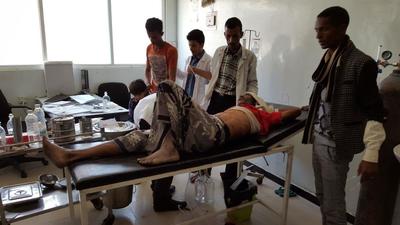Médecins Sans Frontières/Doctors Without Borders (MSF) is responding to a fresh wave of violence that has broken out in some areas of Sudan’s Darfur region along the border with Chad.
In the past week, MSF teams have treated 30 new injured patients, 13 of whom suffered from gunshot wounds, and were evacuated to the nearby town of Abeche for emergency surgery. It is the largest wave of wounded MSF has seen in the last two months.
Care for refugees and returnees from Darfur
In April, MSF opened an emergency project in Tissi, in south eastern Chad, to provide medical and humanitarian assistance to Sudanese refugees and Chadian returnees affected by the fighting in Darfur. The humanitarian crisis is a direct result of the deteriorating security situation in some areas of Central Darfur, which has displaced an estimated 50,000 people to Chad since the beginning of the year.
“In the past three months MSF has treated more than 80 patients for gunshot wounds. The level of violence is extremely concerning and our team is frequently working around the clock to stabilise and refer patients with severe injuries,” says Jason Mills, MSF Head of Mission in Chad.
MSF is running a health facility in the town of Tissi, where, in addition to the wounded, more than 3,500 people have been treated for ailments such as diarrhoea, respiratory tract infections and malnutrition.
Patient Story
Hassan*
"I am 25-years-old and before the conflict started in my region I was living with my family in Um Dukkum, Sudan. A couple of months ago a tribe called the Misseriya burnt our house down and stole all our goods. Some of my family members died; my oldest brother lost two children; my aunt lost one child and in all the confusion, another child disappeared.
To this day we don’t know if the child is alive or dead. After the attack, our family went to Maradef, but at the end of July the Misseriya attacked Maradef. The men were heavily armed and I took part in the fighting. Dozens of people died and many were wounded. I was shot in the upper back.
Because I wasn’t seriously wounded I was able to walk across the border into Chad, but other wounded men travelled by horse or by cart. We walked for 10 hours before a MSF vehicle saw us and picked us up. I am recovering now, but when I get better I will continue to defend myself, as this conflict has touched me at a personal level."
Approaching malaria season
Because of the onset of the rainy season, the team is also worried about the approaching malaria season. MSF is now holding malaria prevention sessions for local residents, and with the help of a network of community health workers, is monitoring the general health situation for the local population in Tissi town, as well as returnees who have settled in surrounding villages.
A second MSF team is now providing primary health care in the Ab Gadam refugee camp, 20 kilometres west of Tissi, where 17,000 refugees have been relocated by the United Nations High Commission for Refugees.
In early August, MSF will open an in-patient department to provide secondary healthcare in the camp for the next two months.
Water distribution
Due to the rain, poor road conditions have made it difficult for water trucks to reach the Ab Gadam camp, leaving refugees with little or no potable water. In mid-July the situation reached a crisis point when the amount of water available dropped below one litre, per person, per day, well below the humanitarian standard of 20 litres per person, per day.
On 21st July, the MSF team was able to rehabilitate a dam close to the camp and distribute 200,000 litres in the following three days, raising the quantity of of water to seven litres, per person, per day by July 23rd.
“MSF is expending considerable effort to improve the water supply in the camp, and to build latrines in order to prevent outbreaks of cholera and hepatitis-E,” says Turid Piening, MSF Health Advisor for Chad.
Despite the logistical challenges, MSF plans to continue its emergency response in the Tissi area at least until the end of the rainy season in October.
Patient Story
Mahamat
"I am 20-years-old and I am from Um Dukkum in Sudan. Because of the conflict in my town, I fled with my family to another town called Maradef. But the fighting spread to Maradef during the last week of July; the town was attacked by a group of heavily armed men who arrived in pick-up trucks.
My brother and I defended ourselves, but on the first night of fighting I was injured. I was prevented from getting treatment at the local hospital so the next day my brother brought me across the border to the MSF health post in Um Dukum, Chad where the MSF health team treated me.
I was told that because of my injuries, I needed to get to the hospital in Tissi as soon as possible. MSF gave me money so we could borrow a motorcycle. It took us a long time to make the trip because the roads were flooded but we finally got to the hospital. I am very thankful to MSF for paying for my transport and am happy with the care that I have received."
* The patients' names have been changed
Find out more about MSF’s work in Chad





